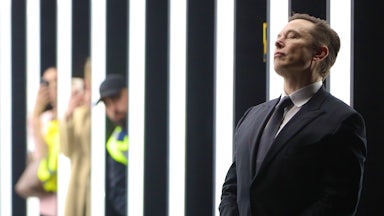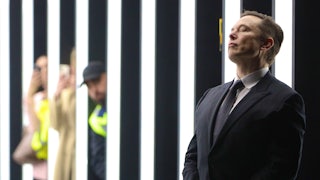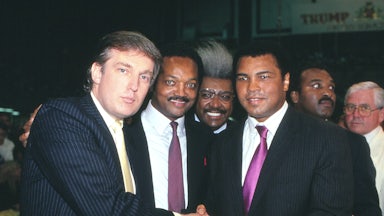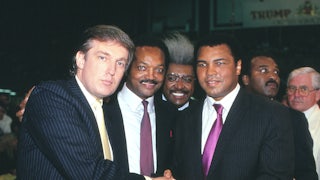Early Tuesday morning, as Israeli rockets struck Gaza in retaliation for Hamas’s devastating attacks over the previous weekend, X owner Elon Musk took a victory lap. “If successful, X will evolve to be the collective consciousness of humanity or, more accurately, the human-machine collective,” Musk tweeted in response to a verified user praising what has been a disastrous stewardship of the company formerly known as Twitter as a “civilization critical purchase.”
The mix of hyperbole and inscrutability is a hallmark of most of Musk’s utterances—as is the sinister, dystopian edge he lends to his inability to be publicly normal. Deducing what he means precisely, on just about any subject, is difficult to do: Musk posts a lot, but he posts badly, his tweets a sort of recorded refutation of Malcolm Gladwell’s (absurd) “10,000 hour rule.”
Nevertheless, Musk is nothing if not consistent. His most recent statements follow the same trajectory as almost any others dating back to when he first made the critical, foolish decision to purchase Twitter in 2022: He believes his efforts to root the social network around his own twisted, hypocritical conception of “free speech” will be liberating, transforming the platform into a “digital town square” that ultimately elevates humanity.
Musk has always talked in the same grandiloquent and messianic terms about Twitter as he does about his other projects. He may genuinely believe that “X,” as it is now known, will be a transformational force for good; it may also be marketing speak aimed at glossing his decision to turn the network into a teeming bazaar of antisocial chuds—and keeping this legion of worshipful followers wedded to him. Often, he seems to be trying to simply convince himself that everything is going well. But over the weekend what became abundantly clear is that Twitter is a ruin.
That Musk’s endeavor was a failure had long been clear—the failing came fast and early after the ill-fated acquisition last fall. But the failure to succeed at what Twitter was in its heyday is one thing. That the service has been drained of its utility is another. Indeed, Twitter’s great strength was its ability to connect its user base to reliable information in moments of fast-moving, complex breaking news. Musk has wrecked all of that, seemingly with that purpose in mind.
The natural consequences of these actions followed. As Hamas attacked Israel and then Israel responded with reprisals against Gaza, the platform became flooded with lies, misinformation, and spun-up fakery of the sort that might endanger people. It is obvious that this is the new normal: Whenever any similar, horrible event happens, Musk’s Twitter will be there, to exacerbate the damage. There is no sign that this can be put right. If anything, the evidence on hand suggests that this is part of the business plan.
Much of the myth of social media’s social utility emerged more than 12 years ago, during the start of the Arab Spring. Then, Twitter and Facebook were used to organize mass protests and to apply public, worldwide pressure on repressive, despotic regimes. In February 2011, CNN’s Wolf Blitzer asked Wael Ghonim, a Google executive and organizer of Egypt’s ongoing protests, “Tunisia, then Egypt, what’s next?” “Ask Facebook” was Ghonim’s reply. “If you want to liberate a government, give them the internet.”
Few predictions have aged as poorly, though Ghonim’s optimism was understandable at the time. Instead of being a force for liberation, tech has been a force for oppression and, at times, genocide and ethnic cleansing. Disinformation, we now know, spreads as easily as, if not more easily than genuine news; social media’s algorithmic hoodoo seems geared toward helping lies achieve escape velocity. And at Musk’s bare-bones Twitter, which has a skeleton crew manning its trust and safety desk, anything goes.
Over the weekend, as events unfolded chaotically across Israel, it was difficult to assess what was real and what wasn’t. That has arguably gotten even harder amid the fallout, both in terms of assessing what exactly happened during horrific attacks on Israeli civilians and on Israel’s response, which has involved the cutting of food, water, and electricity from Gaza’s two million residents.
Per a Wired report from Monday, “Rather than being shown verified and fact-checked information, X users were presented with video game footage passed off as footage of a Hamas attack and images of firework celebrations in Algeria presented as Israeli strikes on Hamas. There were faked pictures of soccer superstar Ronaldo holding the Palestinian flag, while a three-year-old video from the Syrian civil war [was] repurposed to look like it was taken this weekend.” Twitter has gotten slower and worse at removing disinformation before it spreads. And users willing to spend $8 a month for a blue check can boost—and, in some cases, monetize—the spread of misinformation. All told, the social network demonstrated a singular ability to take a complex, fast-moving situation and make it more difficult to comprehend.
This is a disaster for Twitter, which had previously demonstrated an ability to be indispensable during fast-moving crises. Changes made by Musk to the platform—from the gutting of teams devoted to trust and safety, to the removal of “legacy” blue checks for reporters, even to the recent removal of headlines from links—have all made it more difficult to ascertain if what you are seeing in the ruins of your Twitter feed is real or fake, making it much easier to spread misinformation. For over a year, we’ve heard various reports of Twitter’s demise. Some have been hyperbolic; many have failed to appreciate how resilient the the service was before Musk’s arrival. It’s likely that some facsimile of Twitter will exist, far into the future. But a seismic shift in how the platform is perceived has occurred. If it isn’t good for breaking news, then what good is it? Perhaps it’s not a force for good at all.










